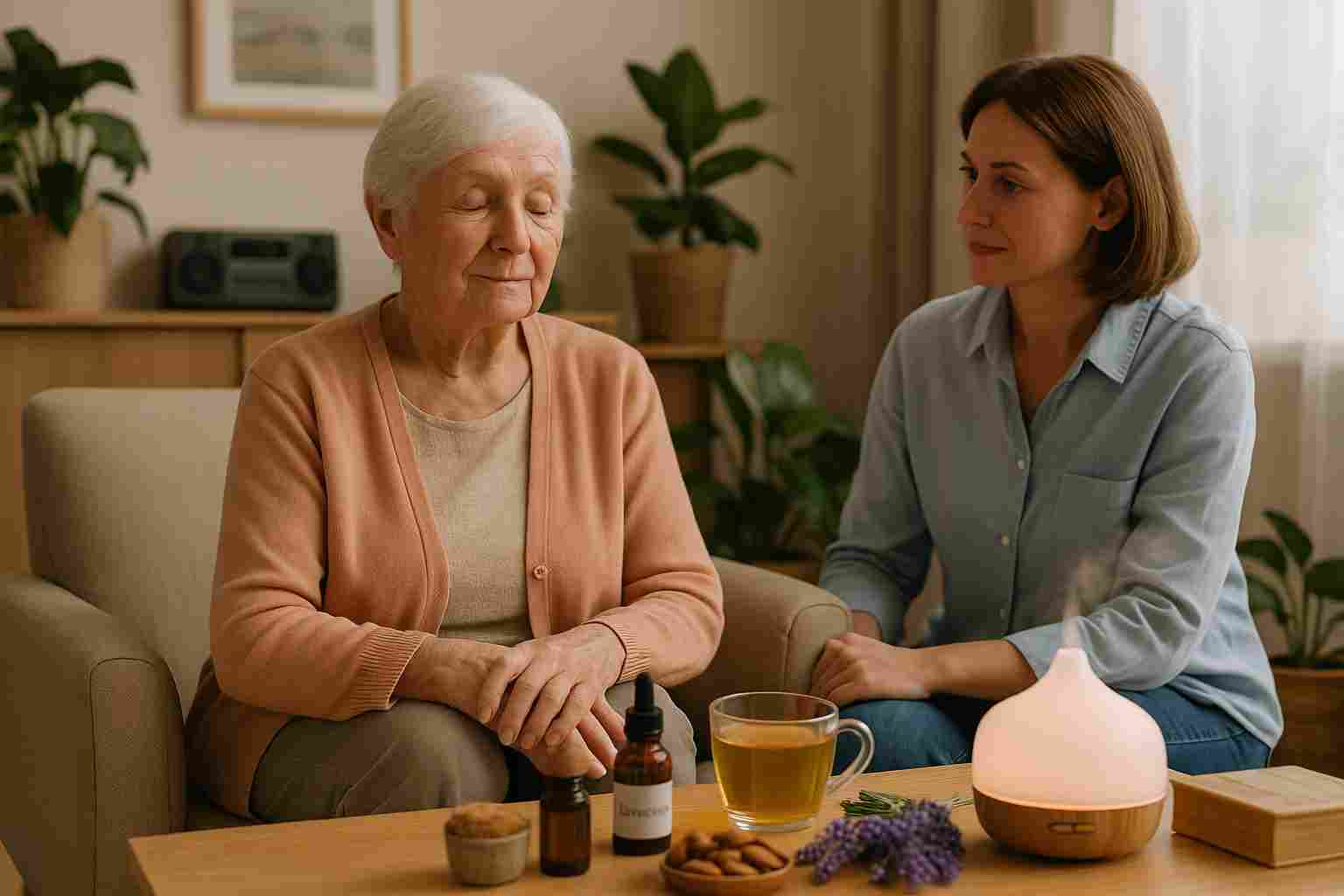Natural remedies for dementia patients are becoming increasingly popular as caregivers and families seek safer, holistic ways to improve daily life. While medical treatment remains essential, non-drug alternatives are gaining recognition for their ability to ease symptoms and promote emotional comfort without harsh side effects.
These gentle approaches—such as music therapy, aromatherapy, herbal support, and brain-boosting nutrition—can help reduce anxiety, improve sleep, and support memory function. Many of these therapies are easy to implement at home and can be personalized to each individual’s history and preferences.
In this article, we explore how natural remedies offer more than symptom relief—they help restore a sense of peace, dignity, and connection for dementia patients. Whether used alongside traditional care or as part of a wellness routine, these remedies support the overall well-being of both patients and caregivers.
Table of Contents
Toggle🌿 Why Choose Natural Remedies for Dementia?
Natural remedies don’t aim to cure dementia, but they can:
- Reduce behavioral symptoms (like aggression or wandering)
- Improve sleep and appetite
- Ease anxiety and restlessness
- Promote emotional connection and calm
Most importantly, these approaches are noninvasive, affordable, and easily adaptable at home.
🎶 1. Music Therapy: The Sound of Memory
Music is one of the most powerful tools in dementia care. It taps into long-term memory, stimulates emotion, and improves engagement.
Benefits:
- Calms agitation and restlessness
- Encourages communication and smiling
- Improves focus during daily routines
Internal Link: Music Therapy for Dementia Patients
This therapy can be personalized with favorite songs from the patient’s youth or cultural background.
🌼 2. Aromatherapy & Essential Oils
Certain scents have shown calming and mood-lifting effects in dementia care. Popular choices include:
- Lavender: Reduces agitation and improves sleep
- Lemon balm: Improves cognitive function and lowers stress
- Peppermint: May boost alertness
Apply through diffusers, massage oils, or gentle room sprays in a calm setting.
🧘 3. Gentle Yoga and Movement
Movement helps maintain muscle strength, coordination, and circulation, while also easing restlessness.
Related Article: Yoga Exercises for Dementia
Even chair-based or bed-based yoga can improve relaxation, balance, and sleep.
🍵 4. Herbal Teas for Relaxation
Herbal teas are among the most widely used and well-tolerated natural remedies for dementia patients, especially when addressing symptoms like anxiety, restlessness, and sleep disturbances. Unlike pharmaceutical sedatives, these teas provide herbal remedies. Teas offer mild, natural support for anxiety and sleep disorders:
- Chamomile : Calming
- Lemon balm : Soothing
- Valerian root: Aids sleep
- Ashwagandha: Reduces cortisol, improves cognition
Please consult a healthcare professional before using herbal supplements, especially alongside medications.
🥗 5. Nutritional Support
A brain-healthy diet improves energy, alertness, and memory function. Focus on:
- Omega-3 fatty acids (from walnuts, flaxseed, fish)
- Leafy greens and berries (antioxidants)
- Magnesium-rich foods (spinach, almonds, dark chocolate)
Internal Link: Mental Health and Nutrition: A Holistic Approach
You may also explore the Green Mediterranean Diet, which is shown to reduce inflammation and support aging brains.
🎨 6. Creative & Stimulating Activities
Dementia patients benefit from engaging in activities that boost joy, memory, and confidence.
Examples include:
- Watercolor painting
- Storytelling or memory journaling
- Gardening or plant care
- Cooking simple recipes
Internal Links:
💤 7. Improve Sleep with Natural Sleep Aids
Sleep disturbances are common in dementia. Instead of sedatives, try:
Magnesium supplementation
Lavender oil before bed
Limiting screen time and stimulants
Daytime sunlight exposure
Internal Link: Dementia and Sleep Problems
🐾 8. Pet Therapy: A Healing Connection
Animal companionship offers unconditional love, physical touch, and emotional stability.
Pets can:
Lower blood pressure
Decrease loneliness
Encourage movement and verbal interaction
Internal Link: Pet Therapy for Dementia Patients
🧠 9. Memory Boxes & Familiar Objects
Memory boxes filled with familiar items, photos, scents, or textures can evoke comforting memories and promote storytelling.
Internal Link: Memory Box for Dementia Patients
🧩 Final Thoughts for Natural Remedies for Dementia Patients
Natural remedies for dementia patients offer a gentle, human-centered way to improve everyday living without relying solely on medications. Whether through music, movement, scent, diet, or compassionate care routines, these holistic methods honor the dignity and individuality of each person.
Combined with professional support, these remedies can uplift mood, reduce stress, and help dementia patients feel more connected and calm.
🔍 FAQs for Natural Remedies for Dementia Patients
1. Can natural remedies cure dementia?
No, but they help manage symptoms and improve quality of life.
2. Are essential oils safe for dementia patients?
Yes, when used properly and under supervision (e.g., diffused, not ingested).
3. What is the best herb for memory?
Ginkgo biloba and rosemary have shown promise, but always consult a doctor first.
4. Is yoga safe for older people and dementia patients?
Yes, especially modified chair yoga or supervised sessions.
5. How can caregivers support dementia patients naturally?
By providing structure, nutrition, gentle stimulation, and emotional reassurance.
6. Are there side effects to using natural sleep aids?
Natural aids are generally mild, but dosage and interactions should be monitored.
7. Can pets really help dementia patients?
Yes! Therapy pets reduce agitation and increase social interaction.
8. What foods help brain function naturally?
Leafy greens, berries, nuts, seeds, and omega-3-rich foods.
9. Can music calm a patient during agitation?
Absolutely—especially familiar songs from earlier life.
10. Should natural remedies replace medication?
No, they should be complementary unless advised otherwise by a medical professional
